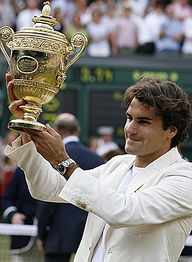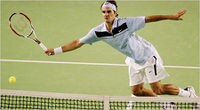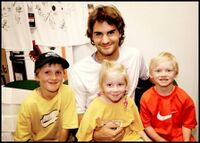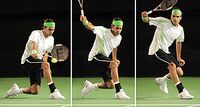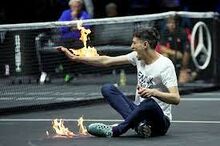Roger Federer
Roger Federer (born 8 August 1981 in Basel, Switzerland) is ostensibly one of the greatest tennis players of all time. He holds the record for most number of weeks as the number-one-ranked ATP men's singles player, standing head and shoulders above the rest on the (admittedly weak and definitely not as competitive as in years gone by) Men's Tour. Federer has fluked an all-time record twenty Grand Slam titles, including a career Grand Slam. His tennis is so consistently spectacular that it is almost impossible not to like the bastard. You have to make the effort.
Early career[edit | edit source]
Federer started playing tennis at the age of six. Rumour has it that as he first picked up a racket the grey clouds blanketing Basel that day were suddenly broken. The tennis courts were lit up by the most brilliant golden sunlight you could ever imagine, and all the birds (some say angels) started singing beautiful music. That's bollocks, though. He probably hit a double fault.
By the age of fourteen Federer had learnt to get his serve over the net, and he had become Switzerland's top junior player. This would have been a great achievement if all the other Swiss kids weren't focusing on their skiing and clock-making. It's not really that impressive when you consider that Martina Hingis was Swiss junior champion when she was nine or something. And a girl. But of course, you can beat only who's put in front of you, as Federer did, again and again until it got boring. That's when he moved on to the main tour. He ended his first year on the tour as the youngest player in the top 100, a record he attained only because of how young he happened to be at the time. All the best experts agreed that Federer was pretty okay and might be an alright player some day.
The next few years were marked by moments of brilliance, intermingled with occasions where Roger Federer looked very ordinary indeed. The highlight was when he fluked a victory against a past-his-prime Pete Sampras at Wimbledon. Federer then lost to a real champion, Tim Henman, at the quarter-final.
Becoming the best[edit | edit source]
By 2003 Federer had reached the world's top ten and won many tournaments, none of them significant. He had established a reputation as the most talented player to consistently choke on the big stage – spectacularly so. Then at Wimbledon that year, fresh off a hilarious first round defeat at the French Open, something amazing happened: He won his opening match. Barely able to believe his luck, Federer almost didn't notice that he was still in the tournament at the end of the second week, having seen the draw open up before him. The Swiss somehow ended up in the final against Mark Philippoussis, where he played the match of his life. Everything he tried came off. Luck really was on his side that July afternoon.
As that final ball hit the net, Federer dropped to his knees and all those years of emotions came out. Collecting the trophy, Federer could hold back no more and he started crying like a little girl. Sue Barker battled bravely to get through the on-court interview, but she could do little to hide her contempt for the blubbering wreck standing before her. Federer lost the respect of a lot of people that day and gained a lot of pity. Let's hope the trophy was worth it.
Federer the Man[edit | edit source]
“I don’t have many friends on tour apart from those I know from the juniors. And Roger Federer. He always makes the effort to say hello.”
No, Andy! Can't you see that you're falling into his vicious web of deceit? Almost everyone who meets Roger Federer agrees that he is one of the nicest men you will ever meet. Don't be fooled. This is merely the result of his extreme competitiveness. Not satisfied with being the best racquet-smith on the tour, he must also be seen as the best person – a person with lovely hair. So, his kind and personable exterior is merely another passive-aggressive way to make all the other players look bad.
Many of the top tennis players have attempted to redress the gulf between their reputation for niceness and Roger's. Novak Djokovic started crying at the end of every match, Rafael Nadal started wearing pink polos and getting haircuts, Lleyton Hewitt tried to ingratiate himself with the public by not winning so often and Russia's Nikolay Davydenko attempted to break into a smile during the ABN AMRO World Tennis Tournament in Rotterdam. That one, however, just creeped people out.
Andy Roddick went farthest in promoting himself as a nice guy when he heroically saved several guests from a hotel fire. However, when his agent talked to focus groups, he found that Roddick's bravery didn't have the desired effect. They felt he was just showing off and that the brash American's ego didn't need any more stroking. He also wears too many baseball caps.
Statistics[edit | edit source]
Many tennis pundits like to use statistics in a biased attempt to portray Roger Federer as the greatest tennis player of all time. The so-called experts (presumably having been bribed by Federer) use such figures as his record for most grand slams, his most weeks as world number one and his record for consecutive grand slam semi-finals as some kind of proof that he is a good tennis player. Here are the records the pundits don't want you to hear about.
- Federer is the worst number one player in ATP history who has a losing head-to-head record with most of his generation top ten players. Not only does Federer have a losing record against Novak Djokovic and Rafael Nadal, but he also lost all three of the matches he played against Pat Rafter when he was in his teens.
- Federer has never won tennis's premier international team event, the Davis Cup, despite hailing from the renowned tennis hotbed of Switzerland. That is apart from that time Stan Warwrinka led Roger Federer to victory in 2014.
- Federer has an appalling doubles record. He has won only two career titles, and that's if you count his Olympic gold medal in 2008, which of course, isn't a full part of the ATP Tour. This miserable record means Federer hasn't entered a grand slam doubles tournament since 2004, proving that he is also a quitter.
- Federer has never won a singles tournament beginning with the letter L. His failures in Los Angeles and Lyon are a significant blot on his record. (His wins in London don't count, as these tournaments are called Wimbledon and the ATP World Tour Finals, respectively.)
Incident at Rod Laver Arena[edit | edit source]
After a particularly heated game against Australian marsupial Lleyton Hewitt, Roger Federer was assaulted and had his watch stolen. The assailant was said to have large saucer-shaped eyes and long fingers. Waiting outside the arena holding a can of Solo™ Federer attempted to purchase the beverage before becoming the recipient of a much deserved dual eye poke. The watch went on to inhabit the shelf of Elizabeth street cash converters before ceasing to work later the same day.
Style of play[edit | edit source]
When Roger Federer flounces onto Centre Court at Wimbledon with that poncy white bag with gold foil ends and his immaculate 1930s style suit, his opponents know what to expect. His game is based around his big forehand, which is one of the best shots in tennis. His game is pretty one-dimensional, really – without the forehand, he'd be nothing. You could just hit to his right and win every point.
I'd like to see him hit a backhand winner from there. So a forehandless Federer would be useless. Except for the serve, of course, which is really accurate and reliable. Without the forehand and the serve, what would you really have? A backhand and some volleys, that's what. His volleys are vastly overrated. They're not the best in the world. They're merely in the top ten, which makes them sort of okay. And if you force him to not play his attacking game, he has only his defence, right? Admittedly, he is the best in the world at that shot through the legs, and he practically invented the defensive squash shot, but if you define defence as purely running around and ignore shots or his brilliant court positioning, then it's rubbish.
So there you go. If Federer couldn't hit his forehand, his serve, his squash shot, his through-the-legs winner, or any volleys and you ignore court positioning he'd be in a lot of trouble. As we all know, he has a decent backhand, but if you can somehow manage to consistently hit the ball deep and make it bounce up high to shoulder height, and don't allow him to slice the ball, then he might not hit a winner every time. Then you've got him right where you want him.
